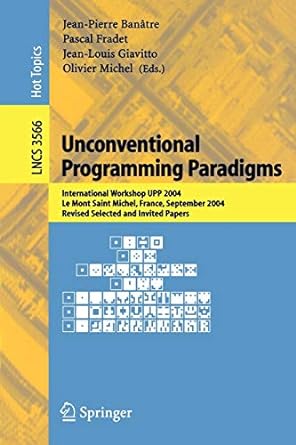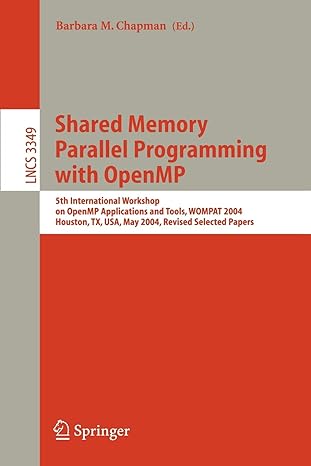Go back


Unconventional Programming Paradigms International Workshop UPP 2004 Le Mont Saint Michel France September 2004 Revised Selected And Invited Papers LNCS 3566(1st Edition)
Authors:
Jean-Pierre Banatre ,Pascal Fradet ,Jean-Louis Giavitto ,Olivier Michel

Cover Type:Hardcover
Condition:Used
In Stock
Include with your book
Free shipping: April 06, 2024Popular items with books
Access to 3 Million+ solutions
Free ✝
Ask 10 Questions from expert
200,000+ Expert answers
✝ 7 days-trial
Total Price:
$0
List Price: $52.15
Savings: $52.15(100%)
Book details
ISBN: 3540278842, 978-3540278849
Book publisher: Springer
Get your hands on the best-selling book Unconventional Programming Paradigms International Workshop UPP 2004 Le Mont Saint Michel France September 2004 Revised Selected And Invited Papers LNCS 3566 1st Edition for free. Feed your curiosity and let your imagination soar with the best stories coming out to you without hefty price tags. Browse SolutionInn to discover a treasure trove of fiction and non-fiction books where every page leads the reader to an undiscovered world. Start your literary adventure right away and also enjoy free shipping of these complimentary books to your door.
Unconventional Programming Paradigms International Workshop UPP 2004 Le Mont Saint Michel France September 2004 Revised Selected And Invited Papers LNCS 3566 1st Edition Summary: Nowadays, developers have to face the proliferation of hardware and software environments, the increasing demands of the users, the growing number of p- grams and the sharing of information, competences and services thanks to the generalization ofdatabasesandcommunication networks. Aprogramisnomore a monolithic entity conceived, produced and ?nalized before being used. A p- gram is now seen as an open and adaptive frame, which, for example, can - namically incorporate services not foreseen by the initial designer. These new needs call for new control structures and program interactions. Unconventionalapproachestoprogramminghavelongbeendevelopedinv- iousnichesandconstituteareservoirofalternativewaystofacetheprogramming languages crisis. New models of programming (e. g. , bio-inspired computing, - ti?cialchemistry,amorphouscomputing,. . . )arealsocurrentlyexperiencinga renewed period of growth as they face speci?c needs and new application - mains. These approaches provide new abstractions and notations or develop new ways of interacting with programs. They are implemented by embedding new sophisticated data structures in a classical programming model (API), by extending an existing language with new constructs (to handle concurrency, - ceptions, open environments, . . . ), by conceiving new software life cycles and program executions (aspect weaving, run-time compilation) or by relying on an entire new paradigm to specify a computation. They are inspired by theoretical considerations (e. g. , topological, algebraic or logical foundations), driven by the domain at hand (domain-speci?c languages like PostScript, musical notation, animation, signal processing, etc. ) or by metaphors taken from various areas (quantum computing, computing with molecules, information processing in - ological tissues, problem solving from nature, ethological and social modeling).
Customers also bought these books
Frequently Bought Together
Top Reviews for Books
Request 636lt32
( 4 )
"Delivery was considerably fast, and the book I received was in a good condition."










